
Related
Topics
Guests
- Laura Poitrasaward-winning documentary filmmaker and producer who played a key role in connecting NSA whistleblower Edward Snowden and the reporters for The Guardian and The Washington Post who published his leaked documents about government surveillance. She also filmed Snowden’s interview for The Guardian. She is working on the third part of a trilogy of films about America post-9/11. The first film was My Country, My Country, and the second was The Oath.
Links
- Praxis Films
- "U.S., British intelligence mining data from nine U.S. Internet companies in broad secret program" (Washington Post)
- "Edward Snowden: the whistleblower behind the NSA surveillance revelations The 29-year-old source behind the biggest intelligenc
- “Edward Snowden: The whistleblower behind the NSA surveillancance revelations.” By Glenn Greenwald, Ewen MacAskill & Laura Poitr
Journalist Laura Poitras is being described as the connection between the NSA whistleblower Edward Snowden and the reporters for The Guardian and The Washington Post who published his leaked documents about government surveillance. Poitras shared a byline on two of the key articles about the ongoing NSA revelations, and filmed the Guardian interview in Hong Kong in which Snowden went public with his identity. But well before she took on Snowden’s case, Poitras has come face to face with issues of privacy and state surveillance over her work as a documentary filmmaker. In an excerpt of an April 2012 interview on Democracy Now!, Poitras discusses her repeated detention and interrogation by federal agents whenever she enters the United States. The interrogations began after Poitras began working on her documentary, “My Country, My Country,” about post-invasion Iraq, and continued with most recent film, “The Oath,” about ex-Guantánamo prisoners returning to Yemen. She estimates she has been detained approximately 40 times and has had her laptop, cellphone and personal belongings repeatedly searched.
Transcript
AMY GOODMAN: We turn, before break, to Laura Poitras, the person now known, as The New York Times described her, as, quote, “the pivotal connection” between the former government contractor Edward Snowden, the writers for The Guardian and The Washington Post, who published his leaked documents about government surveillance. Well, Laura Poitras had a byline on two of the key articles about the ongoing NSA revelations. She also filmed the Guardian interview with Edward Snowden in Hong Kong when he went public with his identity on June 6, shortly after The Guardian and Washington Post published their stories based on the information he provided about the NSA.
Well, Laura Poitras is an award-winning filmmaker who’s been discussing issues of privacy and state surveillance long before this. Her films include The Oath and My Country, My Country, The Oath about Guantánamo prisoners returning to Yemen after being released by the U.S. government.
Last April, Juan González and I spoke to Laura Poitras and asked her to describe the difficulties she faces with immigration officials here in the United States, even as a U.S. citizen, whenever she travels, comes in and out of the country.
LAURA POITRAS: I’ve been stopped at the border since 2006, since I started working on a series of films looking at U.S. post-9/11. And so, I’ve been—I’ve actually lost count of how many times I’ve been detained at the border, but it’s, I think, around 40 times. And—
AMY GOODMAN: Four-zero.
LAURA POITRAS: Four-zero, right. And on this particular trip, lately they’ve been actually sending someone from the Department of Homeland Security to question me in the departing city, so I was questioned in London about what I was doing. I told them I was a journalist and that, you know, my work is protected, and I wasn’t going to discuss it. And then, on this particular occasion, I landed at Newark Airport, and they—what they do when I’m flying, they do passport control inspection at the gate. So they make everyone who’s deplaning show their passport. And so, that’s how they—
JUAN GONZÁLEZ: So they don’t even wait for you to get to Immigration.
LAURA POITRAS: No, I don’t get—I don’t get into Immigration. I get the escorted treatment from—
AMY GOODMAN: So they make everyone show the passport, until they get to you.
LAURA POITRAS: Right.
AMY GOODMAN: And then they take you off the plane.
LAURA POITRAS: And then they take me away. And then I’m escorted, first through Immigration. And so, this has been going on—you know, I’ve been through this several times and kind of know how it goes. But what happened on this particular trip, which was very disturbing, so—
AMY GOODMAN: Just a few weeks ago.
LAURA POITRAS: Yeah. So I was met by two agents at Newark. One of them is Agent Wassum. And I—when they met me, I took out my pen and paper to note their names and the time and—because I’ve always taken notes, so I have a record of the questions that I’m asked and how long I’m detained for, what’s the focus of the interrogation, what they are doing to me. And on this occasion, I took out my pen, and I was ordered to put away my pen. And I didn’t, and I continued to take notes. And I was ordered again to put away the pen, and I didn’t. And then he threatened to handcuff me for not putting away my pen. And at that point, I put away my pen and then walked to Immigration and took out my pen again to take notes, was ordered again to put away my pen, and then was taken into secondary screening. And I asked to speak to a supervisor, explained I was a journalist, explained that legal counsel has told me that I should be taking notes of my detention and interrogation. And then I was told that I couldn’t take notes, that I was free to take notes after I was finished being questioned. And then—
JUAN GONZÁLEZ: Under the theory that what? The pen was a weapon?
LAURA POITRAS: Oh, yeah, that’s right. They said that my pen was a dangerous weapon. So that’s what—that’s Agent Wassum who said that, that my pen was a threat to them. And, you know, I mean, in terms of the context, you have to understand that I’m surrounded by border agents who are all carrying guns, and I’m taking out, you know, a pen that they find threatening. And so, this was, you know, profoundly upsetting. And then I was taken into—I was taken directly into an interrogation room and questioned. I took out my pen again. I was ordered by another agent to put it away. And this went on for quite some time. And I was told during this interrogation—I mean, I’m always asserting my rights as a journalist to not reveal my work, my sources.
AMY GOODMAN: You did a film on Yemen. You did a film on Iraq.
LAURA POITRAS: Yeah, yeah, yeah. And so, this detention started after I finished the first film in 2006, and which was about the occupation of Iraq. And I was told that I was refusing to cooperate with an investigation. And then he said, “Well, it wasn’t an investigation; it was questioning,” but that I was refusing to cooperate. And then I asserted my rights, that actually asserting one’s rights is not refusing to cooperate. And so, this went on for quite some time. And, I mean, it’s something that’s been happening for a while, and I’ve talked about it publicly, but also have been hesitant to, because I don’t want to jeopardize the work that I do.
AMY GOODMAN: They took your computer? They took—
LAURA POITRAS: Not on this trip, no. In the past, yeah.
AMY GOODMAN: They’ve taken your computer?
LAURA POITRAS: On one occasion, they took my computer.
AMY GOODMAN: They’ve taken your phone?
LAURA POITRAS: Yeah. Yeah, on one occasion. I was actually—it was right after, a few days after they—it was actually maybe a week after Jacob’s computer was detained.
AMY GOODMAN: Democracy Now! contacted the Department of Homeland Security for an explanation of why you were detained and interrogated at the airport on April 5th. We received a reply from Anthony Bucci, the public affairs specialist—that’s B-U-C-C-I—in New York City for U.S. Customs and Borders Protection. He emailed, quote: “Due to privacy laws, U.S. Customs and Border Protection is prohibited from discussing specific cases.” He went on to write, quote: “Our dual mission is to facilitate travel in the United States while we secure our borders, our people and our visitors from those that would do us harm like terrorists and terrorist weapons, criminals, and contraband.” He did not answer our additional questions.
LAURA POITRAS: Well, I guess they should add “journalist” to that list.
AMY GOODMAN: That was Laura Poitras, the award-winning journalist and filmmaker who had a byline on two of the key articles in The Washington Post and The Guardian about the ongoing NSA revelations. She also filmed the Guardian interview with Edward Snowden in Hong Kong when he went public with his identity June 6, shortly after the pieces were published about the information he provided to the NSA. To hear and watch our full interview with Laura Poitras, along with NSA whistleblower William Binney and computer expert, Internet expert, Jacob Appelbaum, you can go to our website at democracynow.org. When we come back, Turkey, the ongoing unrest and the general strike there. Stay with us.

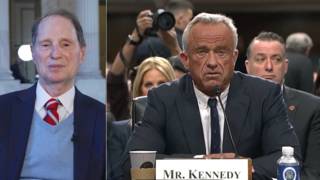
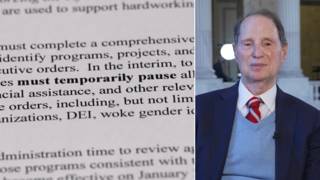

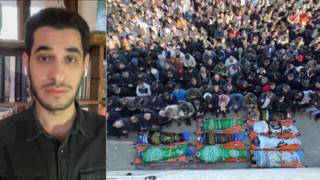





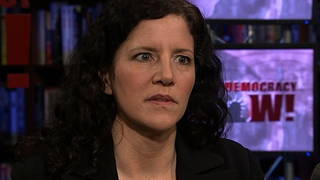
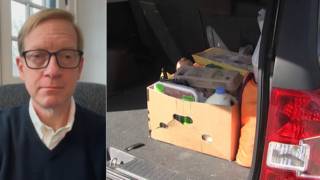
Media Options